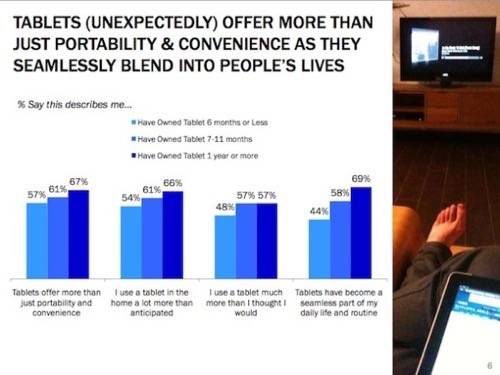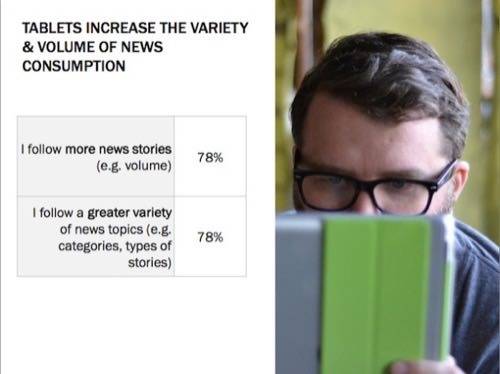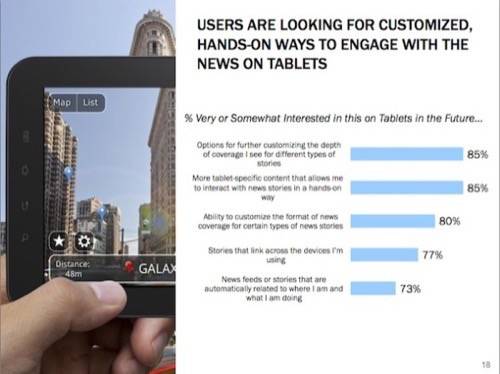A new study from BBC.com and Starcom MediaVest finds that tablets do wonders for news consumption. Tablet owners report reading more stories from more sources on more topics than non-tablet users, they enjoy the experience more, and they go straight to the source more often, rather than relying on aggregators.

But the study also found that the benefits of tablets extend beyond news. Subjects reported a range of improvements tablets brought to their lives, and many of them were unexpected. The study broke down tablet owners based on how long they’ve had tablets and found that all of the positive effects increased over time. Tablets aren’t a fad; they’re fundamentally changing the way people use the Web.
Tablets Are More Than Just Portable

The majority of tablet owners agree that these new devices “offer more than just portability and convenience,” and that sentiment only increases over time. Roughly the same proportions use the tablet at home more than they anticipated. Only 48% of people who have owned a tablet for less than six months use it more than they expected to, but that proportion increases to 57% by the end of the first year.
It takes some time for people to get used to their tablet. Only 44% find that tablets are a seamless part of their lives in the first six months. But by the time they’ve owned a tablet for a year or more, nearly 70% feel that it’s an integral part of their routine.
Another interesting finding was that tablet owners report increased efficiency more than they do “fun,” which runs counter to the popular perception of tablets as unserious devices meant for play. While 62% reported that tablets let them do things more efficiently, 51% said their tablets let them have more fun. And 67% of the subjects said they were “excited to see what tablets become capable of,” so the future of tablet computing looks bright from consumers’ standpoint.
Tablets Whet News Consumers’ Appetites
As far as the content consumed on tablets, the study concentrated on news, a media category that has a ways to go to recover from the disruptions of the digital age. It found that 78% of tablet owners follow more news stories, in terms of both volume and variety, than they did before.

Respondents reported that tablets substantially improved many aspects of the news experience. 81% reported that “tablets make following the news more interesting and enjoyable,” and 78% felt that “tablets substantially improve the news experience overall.”
Tablets Bring Immersion and Control

One of the strongest signals of what tablet owners like about the experience is the customization and control it offers. 85% of tablet owners find it easier to customize and interact with tablet-specific content.
Tablets Can Make Advertising Work
Control over the experience played into subjects’ preferences for news content itself, but it even factored into the way they felt about advertising, that crucial element of the news business.
“The advertisements on my laptop just drive me nuts,” says Mindy, one of the subjects. “On the tablet, I didn’t have that experience.”
“Maybe I wouldn’t mind the ads so much if… it’s leading to something relevant to me,” adds Lauren, another subject, “but if there’s something fun that I can do with an ad to personalize it and make it really fit [for] me, then it’s something I might click on, and I might send it to my friends.”
This video interview with Mindy and Lauren shows an example of an AdJitsu 3D mobile ad, which we reported on last week:
Methodology
The study was conducted by Latitude with a three-phase methodology:
The first phase consisted of exploratory, qualitative phone interviews with tablet owners and news consumers, looking for insights into the role of tablets in users’ lives to direct the rest of the study.
Phase two involved a 20-minute online survey with n=1099 news consumers between the ages of 18 and 54, 88% of whom were current tablet owners. This phase also used interactive elements to capture reactions to ad campaigns and elicit insights about how to make tablets work best for consumers.
The final phase was a week-long immersion trial in which heavy tablet owners were deprived of their devices, and non-tablet owners were immersed in tablet content. These trials were followed by in-depth interviews in which subjects articulated the benefits and drawbacks of their experiences.
What do you think? Have tablets changed the way you browse? Share your thoughts in the comments.

















